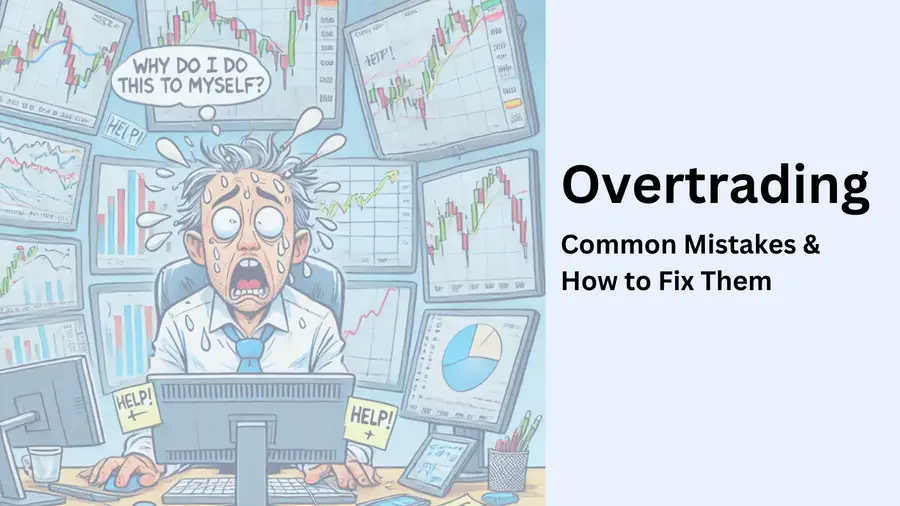Did you know that the average trader spends more time staring at charts than most people do on their phones? While monitoring trades is essential, overtrading can wreak havoc on your mental health. In this article, we explore the psychological risks associated with overtrading, including its impact on mental well-being, common symptoms, and the emotional burnout it can cause. We’ll also discuss how overtrading leads to decision fatigue, increased anxiety, and a decline in trader confidence. Additionally, we provide effective strategies to prevent burnout and manage the psychological risks linked to trading. Join us as we delve into the mind of a trader and uncover how to maintain a healthy trading psychology with the insights from DayTradingBusiness.
What is overtrading in trading and investing?
Overtrading in trading and investing is when a trader makes excessive trades, often driven by emotions like greed or fear, rather than a solid strategy. It leads to impulsive decisions, higher transaction costs, and increased stress. Psychologically, overtrading causes anxiety, impatience, and a loss of discipline, making it harder to stick to a plan and increasing the risk of significant losses.
How does overtrading impact mental health?
Overtrading causes stress and anxiety as traders face constant pressure to make quick decisions, leading to mental exhaustion. It increases emotional volatility, making traders more prone to impulsive actions and panic, which worsen mental health. The fear of losses and chasing gains can lead to burnout, frustration, and a loss of confidence. Overtrading also fosters obsessive behavior, disrupting sleep and personal life, further damaging mental well-being.
What are common psychological symptoms of overtrading?
Common psychological symptoms of overtrading include heightened anxiety, stress, and frustration. Traders may experience impulsiveness, emotional exhaustion, and difficulty focusing. It often leads to feelings of guilt or regret after impulsive decisions and can cause burnout or burnout-like mental fatigue.
Why does overtrading increase stress levels?
Overtrading increases stress because it forces traders to make constant decisions under pressure, leading to mental exhaustion. It often results in impulsive choices, heightening anxiety and fear of losses. The relentless cycle of managing multiple positions can overwhelm the mind, causing frustration and emotional instability. This psychological strain impairs judgment, making stress worse and increasing the risk of burnout.
How does overtrading lead to emotional burnout?
Overtrading drains mental energy by forcing constant decision-making and risk management, leading to stress and anxiety. It triggers emotional burnout as traders push beyond their limits, chasing quick gains and ignoring fatigue. The relentless cycle of high stakes and losses erodes confidence and patience, leaving traders emotionally exhausted and prone to impulsive mistakes.
Can overtrading cause anxiety or panic attacks?

Yes, overtrading can cause anxiety or panic attacks. The constant stress of making frequent trades, fearing losses, and chasing quick profits can overwhelm your nerves. This mental strain often leads to feelings of panic, especially when trades don’t go as planned. The emotional rollercoaster from overtrading can significantly increase psychological stress and trigger anxiety or panic attacks.
What is the link between overtrading and decision fatigue?
Overtrading increases decision fatigue by forcing traders to make frequent, complex decisions, leading to mental exhaustion. This exhaustion impairs judgment, making impulsive or irrational choices more likely. As decision fatigue sets in, traders may ignore risk management, chase losses, or hold onto losing positions longer, escalating psychological stress. Overtrading drains cognitive resources, reducing self-control and heightening the risk of emotional trading errors.
How does overtrading affect trader confidence?
Overtrading erodes trader confidence by increasing emotional stress and leading to impulsive decisions. When traders overtrade, losses pile up, making them doubt their strategies. It creates a cycle of frustration, causing fear of missing out or panic selling. This emotional toll hampers clear thinking, making confidence plummet and increasing the risk of further mistakes.
What are the risks of impulsive trading due to overtrading?
Impulsive trading from overtrading can lead to emotional burnout, increased stress, and poor decision-making. It heightens the risk of chasing losses, causing bigger financial setbacks. The constant urge to trade can erode confidence, foster frustration, and lead to a cycle of impulsive moves. Overtrading also amplifies fear and greed, making traders more vulnerable to panic selling or reckless bets. Psychologically, it damages discipline, erodes patience, and can cause long-term trading anxiety.
How does overtrading influence risk perception?

Overtrading makes traders see risk as smaller than it is, leading to excessive confidence. It blurs the line between manageable and risky trades, boosting impulsiveness. This skewed perception causes traders to ignore warning signs, increasing chances of big losses. Essentially, overtrading distorts risk awareness, making traders underestimate dangers and take on more than they should.
Can overtrading lead to compulsive trading behavior?
Yes, overtrading can lead to compulsive trading behavior. When traders chase quick gains or feel the need to be constantly active, it can develop into a compulsive habit. This behavior often stems from emotional triggers like greed, fear, or the desire to avoid losses, reinforcing risky trading patterns. Overtrading fuels impulsivity, making it harder to stick to a disciplined strategy and increasing psychological stress.
How does overtrading impact focus and concentration?
Overtrading scatters your focus and drains concentration because it overloads your mind with too many trades and decisions at once. It causes mental fatigue, making it harder to spot opportunities or avoid mistakes. The constant pressure and stress reduce your ability to stay calm and clear-headed, increasing impulsive moves. Overtrading shifts your attention away from strategic thinking, leading to mistakes and emotional reactions that impair overall trading discipline.
What strategies help prevent psychological burnout from overtrading?
Set strict trading limits to avoid overexposure. Take regular breaks to clear your mind and reduce emotional stress. Maintain a balanced routine outside trading to prevent obsession. Use a trading plan with predefined entry and exit points to reduce impulsive decisions. Practice mindfulness or stress management techniques to stay calm. Keep a trading journal to track emotions and identify patterns of overtrading. Seek support or coaching to develop healthy trading habits.
How does overtrading affect long-term trading psychology?

Overtrading damages long-term trading psychology by fostering impatience, impulsiveness, and overconfidence. It leads to emotional exhaustion, increased stress, and fear of missing out, which cloud judgment. Repeated overtrading can create a cycle of chasing losses and making impulsive decisions, eroding discipline and confidence over time.
Learn about How does leverage affect day trading psychology?
What are warning signs of psychological distress from overtrading?
Warning signs of psychological distress from overtrading include feeling overwhelmed, persistent anxiety about losses, impulsive trading decisions, difficulty concentrating, insomnia, emotional swings like frustration or despair, and losing confidence in your judgment. You might also experience burnout, irritability, or a sense of being out of control.
How can traders manage the mental risks of overtrading?
Traders can manage the psychological risks of overtrading by setting strict trading limits and sticking to them, maintaining a trading journal to track emotions and decisions, and taking regular breaks to avoid emotional burnout. Developing a solid trading plan helps reduce impulsive decisions driven by greed or fear. Practicing mindfulness or stress-reduction techniques keeps emotions in check. Recognizing signs of overtrading, like fatigue or impatience, prompts traders to pause and reassess. Building discipline and focusing on quality setups over quantity also minimizes emotional strain and helps manage mental risks.
Conclusion about What Are The Psychological Risks of Overtrading?
In summary, overtrading poses significant psychological risks that can severely impact a trader's mental health and decision-making abilities. Recognizing the symptoms and understanding the consequences is crucial for maintaining a balanced approach to trading. By implementing effective strategies, traders can mitigate these risks and enhance their overall performance. For more insights and support on managing these challenges, DayTradingBusiness offers valuable resources tailored to help traders navigate the complexities of the market while preserving their mental well-being.
Sources:
- What leads to overtrading and under-diversification? Survey ...
- Overconfidence and (Over)Trading: The Effect of Feedback on ...
- Self-attribution bias in consumer financial decision-making: How ...
- Survey data on Vietnamese retail investors׳ trading behavior and ...
- Overconfident Investors, Predictable Returns, and Excessive Trading